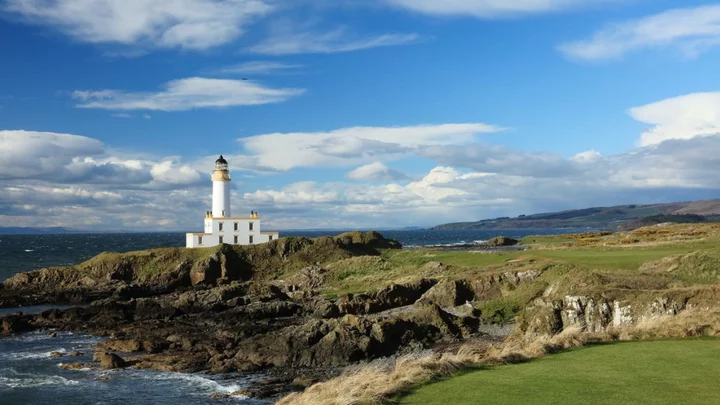Turnberry: What’s it like to play at Trump’s famous golf course?
Views: 1702
2023-08-23 17:45
History is a malleable thing, and Turnberry must be the only world class golf course with two origin stories. There’s the astounding links which was founded in 1906 and hosted four Open championships, including the iconic “Duel in the Sun” between Tom Watson and Jack Nicklaus in 1977, and there’s Trump Turnberry: a beacon of lavish luxury sitting proud along the landscape, sitting shiny and bold on the edge of Scotland’s wild west coast. Let’s address the orange elephant in the room now before we go on: Trump’s name is everywhere. When they bought the place in 2014, the Trump Group set about turning the place into a haven for golfers, celebrities and tourists alike, in search of links golf perfection and top-end customer experience. They’ve managed to do exactly that, but Trump was never going to be a silent owner. That’s hardly his style after all, and there is no doubt that the name alone will deter some from coming. He must be fully aware that his politics and personal reputation will make people think twice about the place, as deeply impressive as it is, and he clearly doesn’t care one iota. What was clear and obvious, though, is that since purchasing the place, the elemental landscape is unmoved, the two outstanding courses here are deeply impressive, and truly transcendent golfing experiences are ready to be had here. I sampled the newly-launched Ailsa membership during my stay on this breezy, sun-kissed patch of Scotland, and it was clear not only that the golfing facilities and the hotel are some the finest in the world, but that the Ailsa course is as close to the perfect links golf course as I have had the pleasure of playing. It has an interesting past, this place. The enormous Turnberry hotel was designed by James Miller in 1906 to fit alongside the new railway and was used during both wars to house the military. It sits high on the hill, guiding players home along the back nine holes of the main Ailsa course and second track the King Robert the Bruce. The sheer scale of the place is impressive in itself. The Trump group transformed the building with opulent touches since purchasing it back in 2014 and added a grand ballroom which regularly hosts wedding ceremonies and adds even more size to the building. We walked by intriguing whisky tasting areas and lavish ceremonial suites on the way up to our quarters, which both came with palatial bathrooms with golden fittings and beautiful views out towards the coast from the generous rooms. There are a couple of excellent dining options for golfers looking to find comfort after coming off the course, as you’d expect. The Duel in the Sun restaurant in the clubhouse was refurbished in 2016 and offers smart, but relaxed surroundings for post-round debriefs overlooking the 18th holes of both the King Robert the Bruce and the Ailsa – the latter having played host to the most dramatic finishes to the Opens of 1977 and 2009, where Stewart Cink clinched victory from veteran Tom Watson and denied him the fairy-tale finish. The plusher 1906 restaurant is found in the hotel, with views catching the last light of the day looking down the hill to the coast. Named after the year the hotel was opened, the menu offers refined, locally inspired cuisine, and a really excellent wine list – a hearty glass of Gigondas always goes down well, but never more so than after a long round of golf, looking out as the sun sets over Scotland’s stunning west coast. Ailsa Club members also have access to the exceptional spa facilities, including a 65-foot heated infinity pool with views of Ailsa Craig and complete with men’s and women’s steam rooms and saunas – which proved perfect for getting out of the wind after our windy, damp round on the first day - as well as a gym decked out with top of the range equipment. There was also a trip to the stables to meet the horses, which can be taken out for a gallop on Turnberry beach and treks around the estate, or hired out for riding lessons. The extracurricular offers include clay shooting, paddle boarding and kayaking, too. Golf, though, is king. There are three courses to choose from here: the famous Ailsa, the championship King Robert the Bruce and the 9-hole Arran. Almost anywhere else in the world the King Robert the Bruce course would be a standout all on its own, which will test players of all abilities and provide some of the best views in Scottish golf. A battering, bludgeoning wind added a little spice to our game here, with great ‘risk and reward’ holes right along the edge of the land. The Arran is also a gem of a links track and kept in fantastic condition, and the golf academy is kitted out with a state-of-the-art fitting centre and a driving range with yet more picturesque views out to the land’s edge. There’s no doubt that the famous Ailsa is the jewel in the crown, though, tying all the opulence around it together and grounding it in links golf perfection. The course was altered in 2016 and the influence of the American owners translates in subtle ways - despite the hot weather in the weeks before our visit, the course had been extensively watered, ensuring a lush feel and springy fairways that still allowed for plenty of roll out off the tee. It was my first time playing the course, so I was unable to compare the major changes made in 2016 by course designer Martin Ebert to what came before. But turning the par-4 ninth hole in the shadow of the famous Turnberry lighthouse into a par-3 makes for an incredibly dramatic experience. It has to rank among the best par-3s anywhere in the world: hitting over craggy cliff face is daunting enough from the yellow and white tees, but playing off the championship tees with a 240-yard carry to the green with the waves below is an entirely different level - if the wind gets up from back there, you may as well throw your ball in the water and save yourself the effort. Another major change comes a short while later at the 11th. Previously, the hole saw players aim inland, but now the green is located right next to the land’s edge on yet another stunning, stand-out hole that brings an end to a remarkable stretch right along the coast. Golfers talk about the “framing” of certain holes, with the surroundings often more important than the hole itself when it comes to creating impact. Turnberry has to be one of the best framed courses in the world. There’s the lighthouse and the Ailsa Craig peeking over the humps and hollows on most holes, and of course the Firth of Clyde skirting alongside too. Tough though they are, there’s still something in both courses for the mid to higher handicappers. Of course, they’ll reward better ball strikers and those better able to read subtle breaks on the greens. But having played brutal links courses along this same coastline that beat me up good and proper, the Ailsa left me feeling confident and ready to play again straight away. It’s the kind of place you come off feeling grateful to have played, with an experience you never forget. What part of my experience of the course will live longest in the memory for players trying it for the first time? Something sensory, perhaps, like the salty air whipping off the ocean and stinging the nostrils, or the feel of the bouncy fairways under foot. The silhouette of the lighthouse framing signature hole after signature hole, maybe, or the enormous Scotland flag stood commandingly by the 18th green, blowing with the prevailing southerly wind which is the course’s biggest natural defence on restless days. For me, there’s a more easily defined memory I’ll cherish, and it’s the sight of my brother making a hole in one on the sixth hole right by the land’s edge, letting out a visceral howl of joy and disbelief, before taking off like a greyhound towards the green to pluck his ball from the cup: a magical moment caught in time which embodied the transcendent nature of this sensational golf course. It brought home that Turnberry’s Ailsa course has been there for over a century and will remain constant, even while the context of its surroundings and its history may change. Sign up to our free Indy100 weekly newsletter Have your say in our news democracy. Click the upvote icon at the top of the page to help raise this article through the indy100 rankings.

History is a malleable thing, and Turnberry must be the only world class golf course with two origin stories.
There’s the astounding links which was founded in 1906 and hosted four Open championships, including the iconic “Duel in the Sun” between Tom Watson and Jack Nicklaus in 1977, and there’s Trump Turnberry: a beacon of lavish luxury sitting proud along the landscape, sitting shiny and bold on the edge of Scotland’s wild west coast.
Let’s address the orange elephant in the room now before we go on: Trump’s name is everywhere.
When they bought the place in 2014, the Trump Group set about turning the place into a haven for golfers, celebrities and tourists alike, in search of links golf perfection and top-end customer experience. They’ve managed to do exactly that, but Trump was never going to be a silent owner. That’s hardly his style after all, and there is no doubt that the name alone will deter some from coming. He must be fully aware that his politics and personal reputation will make people think twice about the place, as deeply impressive as it is, and he clearly doesn’t care one iota.
What was clear and obvious, though, is that since purchasing the place, the elemental landscape is unmoved, the two outstanding courses here are deeply impressive, and truly transcendent golfing experiences are ready to be had here. I sampled the newly-launched Ailsa membership during my stay on this breezy, sun-kissed patch of Scotland, and it was clear not only that the golfing facilities and the hotel are some the finest in the world, but that the Ailsa course is as close to the perfect links golf course as I have had the pleasure of playing.
It has an interesting past, this place. The enormous Turnberry hotel was designed by James Miller in 1906 to fit alongside the new railway and was used during both wars to house the military. It sits high on the hill, guiding players home along the back nine holes of the main Ailsa course and second track the King Robert the Bruce.
The sheer scale of the place is impressive in itself. The Trump group transformed the building with opulent touches since purchasing it back in 2014 and added a grand ballroom which regularly hosts wedding ceremonies and adds even more size to the building. We walked by intriguing whisky tasting areas and lavish ceremonial suites on the way up to our quarters, which both came with palatial bathrooms with golden fittings and beautiful views out towards the coast from the generous rooms.
There are a couple of excellent dining options for golfers looking to find comfort after coming off the course, as you’d expect. The Duel in the Sun restaurant in the clubhouse was refurbished in 2016 and offers smart, but relaxed surroundings for post-round debriefs overlooking the 18th holes of both the King Robert the Bruce and the Ailsa – the latter having played host to the most dramatic finishes to the Opens of 1977 and 2009, where Stewart Cink clinched victory from veteran Tom Watson and denied him the fairy-tale finish. The plusher 1906 restaurant is found in the hotel, with views catching the last light of the day looking down the hill to the coast. Named after the year the hotel was opened, the menu offers refined, locally inspired cuisine, and a really excellent wine list – a hearty glass of Gigondas always goes down well, but never more so than after a long round of golf, looking out as the sun sets over Scotland’s stunning west coast.
Ailsa Club members also have access to the exceptional spa facilities, including a 65-foot heated infinity pool with views of Ailsa Craig and complete with men’s and women’s steam rooms and saunas – which proved perfect for getting out of the wind after our windy, damp round on the first day - as well as a gym decked out with top of the range equipment. There was also a trip to the stables to meet the horses, which can be taken out for a gallop on Turnberry beach and treks around the estate, or hired out for riding lessons. The extracurricular offers include clay shooting, paddle boarding and kayaking, too.
Golf, though, is king. There are three courses to choose from here: the famous Ailsa, the championship King Robert the Bruce and the 9-hole Arran. Almost anywhere else in the world the King Robert the Bruce course would be a standout all on its own, which will test players of all abilities and provide some of the best views in Scottish golf. A battering, bludgeoning wind added a little spice to our game here, with great ‘risk and reward’ holes right along the edge of the land. The Arran is also a gem of a links track and kept in fantastic condition, and the golf academy is kitted out with a state-of-the-art fitting centre and a driving range with yet more picturesque views out to the land’s edge.
There’s no doubt that the famous Ailsa is the jewel in the crown, though, tying all the opulence around it together and grounding it in links golf perfection. The course was altered in 2016 and the influence of the American owners translates in subtle ways - despite the hot weather in the weeks before our visit, the course had been extensively watered, ensuring a lush feel and springy fairways that still allowed for plenty of roll out off the tee. It was my first time playing the course, so I was unable to compare the major changes made in 2016 by course designer Martin Ebert to what came before. But turning the par-4 ninth hole in the shadow of the famous Turnberry lighthouse into a par-3 makes for an incredibly dramatic experience. It has to rank among the best par-3s anywhere in the world: hitting over craggy cliff face is daunting enough from the yellow and white tees, but playing off the championship tees with a 240-yard carry to the green with the waves below is an entirely different level - if the wind gets up from back there, you may as well throw your ball in the water and save yourself the effort.
Another major change comes a short while later at the 11th. Previously, the hole saw players aim inland, but now the green is located right next to the land’s edge on yet another stunning, stand-out hole that brings an end to a remarkable stretch right along the coast. Golfers talk about the “framing” of certain holes, with the surroundings often more important than the hole itself when it comes to creating impact. Turnberry has to be one of the best framed courses in the world. There’s the lighthouse and the Ailsa Craig peeking over the humps and hollows on most holes, and of course the Firth of Clyde skirting alongside too.
Tough though they are, there’s still something in both courses for the mid to higher handicappers. Of course, they’ll reward better ball strikers and those better able to read subtle breaks on the greens. But having played brutal links courses along this same coastline that beat me up good and proper, the Ailsa left me feeling confident and ready to play again straight away.
It’s the kind of place you come off feeling grateful to have played, with an experience you never forget. What part of my experience of the course will live longest in the memory for players trying it for the first time? Something sensory, perhaps, like the salty air whipping off the ocean and stinging the nostrils, or the feel of the bouncy fairways under foot. The silhouette of the lighthouse framing signature hole after signature hole, maybe, or the enormous Scotland flag stood commandingly by the 18th green, blowing with the prevailing southerly wind which is the course’s biggest natural defence on restless days.
For me, there’s a more easily defined memory I’ll cherish, and it’s the sight of my brother making a hole in one on the sixth hole right by the land’s edge, letting out a visceral howl of joy and disbelief, before taking off like a greyhound towards the green to pluck his ball from the cup: a magical moment caught in time which embodied the transcendent nature of this sensational golf course. It brought home that Turnberry’s Ailsa course has been there for over a century and will remain constant, even while the context of its surroundings and its history may change.
Sign up to our free Indy100 weekly newsletter
Have your say in our news democracy. Click the upvote icon at the top of the page to help raise this article through the indy100 rankings.









